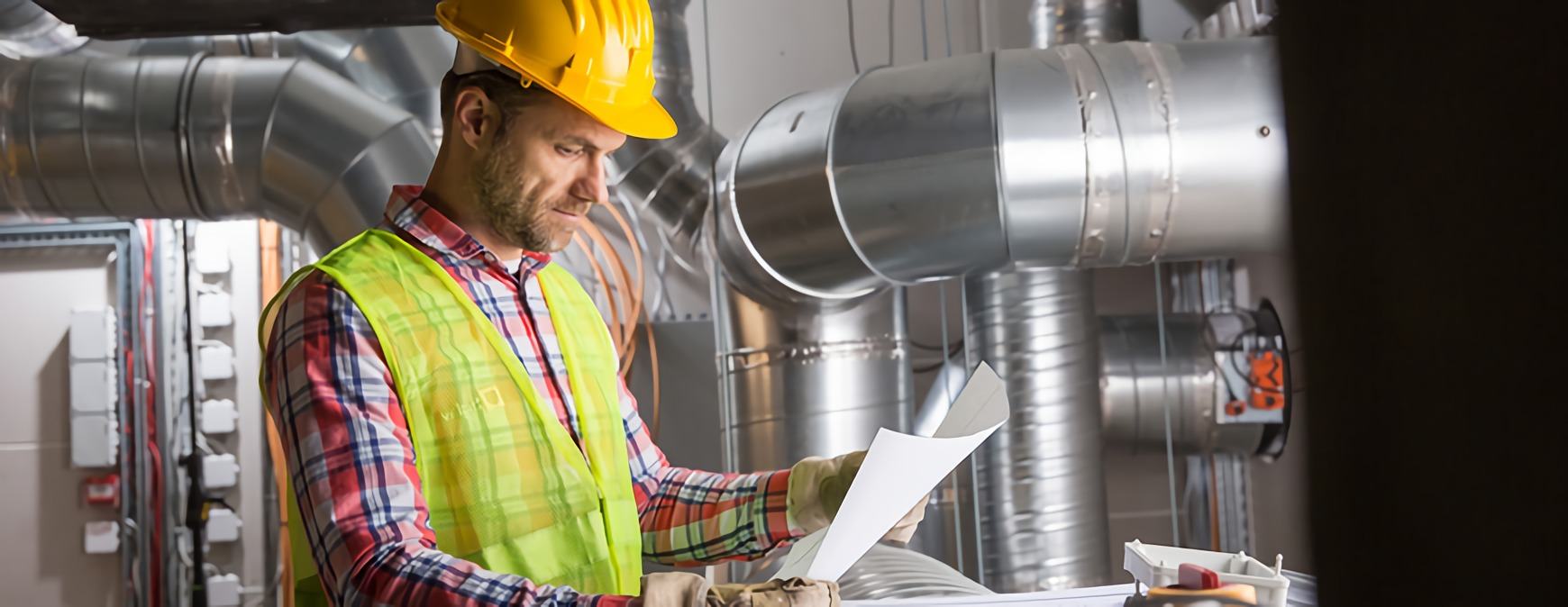RSI is a Great Training Option for Everyone
Learn more about how we can prepare you to advance your career.
HVAC/R is not a one-size-fits-all career. With job growth for heating, air conditioning and refrigeration mechanics and installers (49-9021) set at 14 percent through 2024, 1 the HVAC/R field is also diverse in the types of jobs it offers to people who specialize in this profession, depending on their level of training and experience.
Climbing the HVAC/R Career Ladder
The HVAC/R industry is comprised of various types of occupations:
- Residential air conditioning and heating
- Commercial air conditioning and heating
- Industrial and commercial refrigeration
While the equipment in these fields operate on the same principles, they have differing capacities and levels of complexity. 2 The technician’s job title and years of experience determine what types of equipment they operate on a jobsite.
The various job sectors, however, share the same career trajectory:
- Entry-level
- Professional-level
- Mid-level
- Senior-level
Entry-Level HVAC/R Jobs
Entry-level jobs are perfect for individuals who have recently completed an HVAC/R training course or have less than two years of experience working in the field. 3
Get Started on the Path to a New Career
Fill out our form to learn how we can help you change your life.
Entry-Level Helper
Entry-level helpers assist senior technicians with the installation and servicing of residential and commercial equipment, taking on tasks like these:
- Carrying
- Lifting
- Placing parts
- Cleaning up after installation
- Service calls
They may also drive to pick up components or complete other errands. Basic safety training and a clean driving record are required. Medium-to-large contracting companies typically employ entry-level helpers.
Rough-In Installer
“Rough-in” is another term for the initial phases of installing HVAC/R equipment like these:
- Electrical, control and refrigerant lines
- The thermostat
- Duct boots
- Duct runs
Requirements for the position include knowing how to read blueprints, lay out ductwork, braze and use basic hand tools.
Professional-Level HVAC/R Jobs
HVAC/R technicians with three years of working in the field are considered professionals, and they can take on more responsibilities. 4
Start-Up Technician
After the rough-in installer’s job is complete, a start-up technician arrives on the site to check that the equipment operates to the manufacturer’s standards. This includes several steps:
- Checking that it starts right.
- Checking that the equipment runs safely and efficiently.
- Recording information necessary for the warranty.
These professionals must possess good writing and reading comprehension skills, know how to troubleshoot electrical equipment and be proficient in refrigerant charging.
Service Technician
HVAC/R service technicians are responsible for regularly assessing equipment and identifying what type of maintenance is required.
Diagnosing system problems and making repairs is also a big part of their job, so they must be good at troubleshooting air-distribution, electrical and refrigerant problems.
Service technicians must also be competent at using several types of equipment:
- Pipe cutters
- Wrenches
- Carbon-monoxide testers
- Voltmeters
- Combustion analyzers
- Acetylene torches
Mid-Level HVAC/R Jobs

Mid-level professionals usually have at least eight years of training and experience, taking on managerial or leadership roles at the organizations they work for. 5
Service Manager
Service managers direct the operation of an HVAC/R company or maintenance department, from assigning specific jobs to technicians to overseeing the outcome of each employee’s work.
These professionals must have excellent communication and management skills, as well as technical expertise. 6
Systems Designer or Engineer
Individuals with a background in HVAC/R, bachelor’s degrees in mechanical engineering and professional engineering licenses can design components and systems. 7
Their jobs are comprised of various responsibilities:
- Systems design
- HVAC/R application service protocol establishment
- Team supervision
- Vendor contract negotiation
- Equipment selection
- Piping and ductwork sizing
- Site surveying
- Installation procedure development
Systems designers and engineers must have a knack for details and possess strong physics, math, computer and communications skills.
Senior-Level HVAC/R Jobs
At the senior level, individuals typically either own or run an HVAC/R business. Technicians might work up to managerial positions over several years or open their own establishments once they’ve gained enough experience in the industry.
HVAC/R Business Owner or Supervisor
HVAC/R business owners and supervisors are often responsible for marketing and financial management—tasks not typically delegated to technicians.
Many contractors choose to specialize in one area, such as residential or commercial heating and cooling. They may also seek certifications from industry organizations to validate the quality of their work to customers. 8
No secret formula for running a successful HVAC/R business exists, but treating employees and customers with honesty and respect can go a long way.
Where Do HVAC/R Professionals Work?
The HVAC/R industry holds numerous career options in a variety of different work settings:
- Factories
- Offices
- Medical facilities
- Research laboratories
Want to learn more about the nature of an HVAC/R career? Check out our infographic about where an HVAC/R job could take you, or request more information about our school or to schedule a tour.
Additional Sources
1 – https://www.bls.gov/ooh/installation-maintenance-and-repair/heating-air-conditioning-and-refrigeration-mechanics-and-installers.htm#tab-6
2 – Title: Fundamentals of HVAC; Authors: Carter Stanfield and David Skaves; Air-Conditioning, Heating, and Refrigeration Institute; Second Edition; Textbook page 6
3 – http://www.businessnewsdaily.com/8411-job-search-tactics.html
4 – http://www.businessnewsdaily.com/8411-job-search-tactics.html
5 – http://www.businessnewsdaily.com/8411-job-search-tactics.html
6 – Title: Fundamentals of HVAC; Authors: Carter Stanfield and David Skaves; Air-Conditioning, Heating, and Refrigeration Institute; Second Edition; Textbook page 7
7 – https://www.bls.gov/ooh/architecture-and-engineering/mechanical-engineers.htm#tab-4
8 – http://smallbusiness.chron.com/tips-starting-hvac-business-2375.html
This blog has been labeled as archived as it may no longer contain the most up-to-date data. For a list of all current blog posts, please visit our blog homepage at https://www.rsi.edu/blog/




